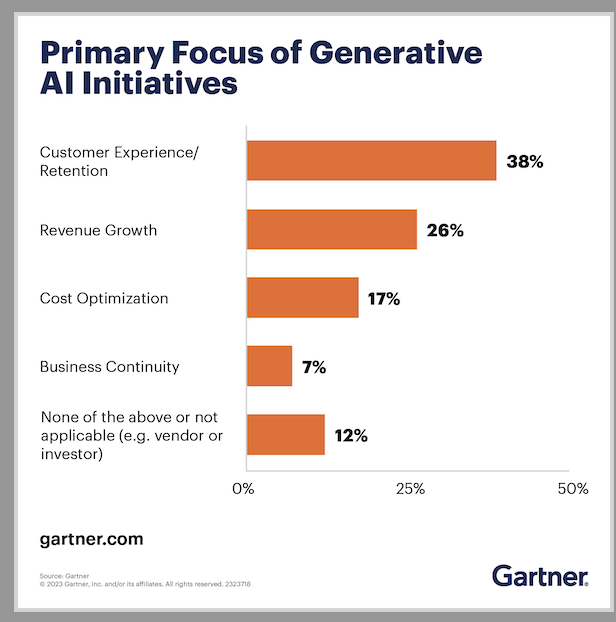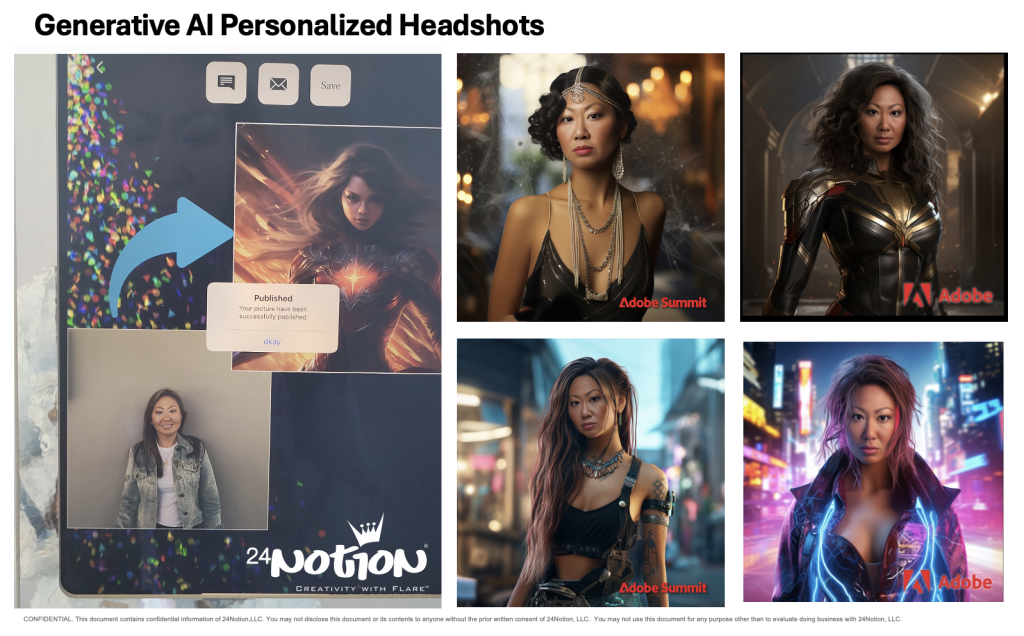In just a few short years, artificial intelligence (AI) has gone from futuristic fever dream to fervent and active opportunities for businesses and individuals across the world. The quick arrival of actionable generative AI (gen AI) has enchanted the world, throwing open the door to AI capabilities that are rapidly changing industries and consumer expectations.
Generative AI can learn from existing artifacts to generate new, realistic artifacts (at scale) that reflect the characteristics of the training data but don’t repeat it. It can produce a variety of novel content, such as images, video, music, speech, text, software code and product designs. According to Forrester, 60% of workers will regularly use gen AI by the end of this year, and by 2030, gen AI is forecasted to influence more than 11 million U.S. jobs.
AI’s Quick Rise
What makes generative AI so powerful is it’s ability to learn from existing artifacts to generate new and unique assets at scale, in the form of content, images, video, music, software code, product designs and more. It’s constantly evolving and fine-tuning itself, resulting in faster product development, enhanced customer experience and improved employee productivity, according to Gartner, and which continues to create a growing number of use cases that are altering the way we work and live.

Use Cases and Success Stories
Generative AI has found applications across various industries and for consumers, leading to several popular use cases. Here are some of the most notable ones:
- Content Generation and Technology: Gen AI is widely known for its convenient use of creating content such as articles, blog posts, product descriptions, and social posts. It can generate text that mimics human writing styles, making it valuable for content marketers and publishers. Tools like Jasper, ChatGPT, Firefly and Surfer SEO are great examples of tools that businesses of all shapes and sizes are utilizing to support their marketing efforts, and produce more quality work with tighter budgets. For larger enterprises, AI is being developed in-house. For example, Apple has publicly begun to explore multiyear deals worth at least $50 million to train its generative A.I. systems on publishers’ news articles. Recently, 24Notion created multiple program activations for Adobe roadshows and helped launch Generative AI personalized photo opportunities for attendees. This experiential engagement demonstrating how GenAI can easily create images, instantly transforming me into a superhero, cyber punk, a member of the Roaring 20’s, and anything else in between. These technologies give way to unlimited opportunities for brand marketers—while keeping to the confines of a realistic budget.


- Fashion and Product Design: In industries like fashion and product design, generative AI is used to generate new designs, patterns, and styles. It can assist designers in exploring a wide range of possibilities and coming up with innovative concepts to upgrade the shopping experienced to be ultra-personalized for each individual. One example of a brand using gen AI well is ASOS, a UK-based retailer, that has started utilizing AI for merchandise predictions, focusing on items like T-shirts, dresses, and denim. Their model is trained on recorded deals, returns data, product popularity, and trends. It predicts weekly demand for each item size and warehouse for upcoming seasons. This strategy offers a level of detail and precision previously unattainable. Another example comes from Tommy Hilfiger, which through the creation of FashionVerse, blends gen AI with mobile gaming for fashion enthusiasts and offers a lifelike 3D styling experience.

- Healthcare and Drug Discovery: Several use cases for gen AI in healthcare are emerging, and these models are employed for tasks such as generating synthetic medical images, designing drug molecules, and predicting disease outcomes. They help researchers analyze medical data and accelerate the drug discovery process. While AI technology has been used in the healthcare industry for years gen AI represents a whole new arena of play that can help unlock a piece of the current unrealized $1 trillion of improvement potential present in the industry. One real life example comes from Google’s AI-powered Med-Palm 2, Google’s medical large language model ( LLM) which was trained on the MedQA dataset and achieved an 85% accuracy rate while answering relevant medical questions. Even as a work in progress, that is a strong start for generative AI as a diagnostics assistant.

- Intelligent Automotive Personal Assistants: Automotive companies are leveraging generative AI in various ways to enhance vehicle design, engineering, manufacturing, and customer experience. At CES 2024, we saw how certain brands were bringing this to life. Take BMW for example, who demonstrated innovative development projects that offer a glimpse into the future. According to BMW, in the near future, consumers can teleoperate a BMW iX and guide it around, and discover as a passenger the potential offered by augmented reality glasses during a journey. They also featured a new generative AI capability of the BMW Intelligent Personal Assistant powered by the Alexa large language model (LLM), enabling quick answers and how-to responses on vehicle features.
The Future is Unlimited
As gen AI continues to advance, we can expect to see even more diverse applications emerge in various domains. It’s an exciting time to get to witness evolving use cases across businesses, and how these will ultimately impact consumers’ mindsets and actions.



